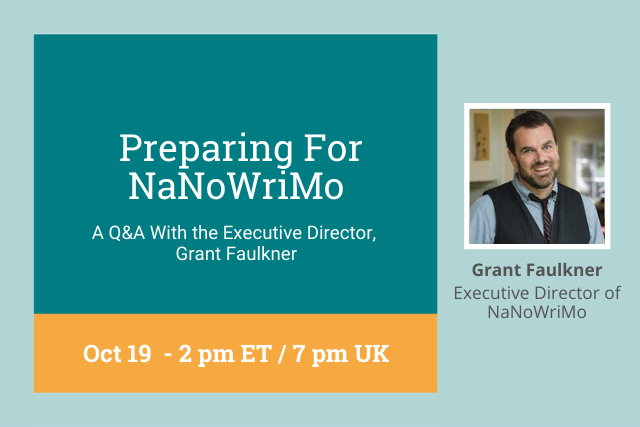
For the last two decades, writers around the world have dedicated the month of November to writing a novel. National Novel Writing Month, or NaNoWriMo, encourages writers to write 50,000 words in a month.
That sounds crazy, right? But hundreds of thousands of people participate and succeed every year.
If you’ve always wanted to write a book, but you keep saying you don’t have the time or discipline, NaNoWriMo is for you. If you’ve already written books, but you’ve struggled with motivation lately, NaNoWriMo is for you. If you have a book that you’ve started but can’t seem to finish, guess what? Yes, NaNoWriMo is for you.
NaNoWriMo, or NaNo for short, is my favorite time of year, and it’s become one of the most important aspects of my life. I’m a Municipal Liaison, or ML. This means I’m one of the volunteers who organize events and foster community in my geographic region. (Don’t worry, I’ll explain regions more later.)
So once you’ve committed to writing 50,000 words in 30 days, how do you survive? Keep reading for my best advice to surviving and thriving during NaNo.
It’s All About Perspective
I’m not going to lie to you: 50,000 words is a lot. But don’t expect to churn out a Lord of the Rings-length epic during November.
Fifty thousand words is generally considered the minimum word count for a novel, but it’s actually pretty short.
Let’s look at some statistics. According to Amazon’s Text Stats, Aldous Huxley’s Brave New World is considered the median book length, and it comes in at 64,531 words. Another dystopian classic, Animal Farm, is actually a novella, and it sits at just 29,966 words.
But if it’s been a while since you’ve read these high school-required classics, here are some more modern examples. The Golden Compass has 112,815 words, while A Game of Thrones, the first (and shortest!) book in George R.R. Martin’s famous series, has 298,000 words.
Finally, War and Peace, generally considered the longest novel, is 561,304 words, making it longer than 11 NaNoWriMo novels!
So, no one is expecting you to be the next Tolstoy in November. A 50,000 word novel is completely attainable.

Pace Yourself
If you divide 50,000 by 30, you get about 1,667 words a day. That’s less than four pages, double-spaced, every day for a month. Doesn’t that seem less daunting?
Some days, you are going to be on a roll, and you’ll suddenly have 3,000 brand-new words. Other days, getting just one paragraph will feel like pulling teeth. That’s okay! Life happens.
If you know that writing during the work week will be difficult, aim to play catch-up on the weekends. You don’t have to write the full 1,667 words every day.
Likewise, you don’t have to write all in one sitting. Write a page in the morning and scribble out a couple of paragraphs on your lunch break. Remember, you can’t write a book if you’re too tired to think.
Lock Up Your Inner Editor
Resist the urge to edit as you write. This is what slows down the writing process. NaNoWriMo is about getting words on the page. Plus, if you end up deleting words, how will you ever hit your goal?
Edit after November. Turn off those red squiggly lines. I’ve even heard of writers who change their font color to white during November so they can’t see what they’ve written.
This is the hardest thing to learn, and honestly, I struggle with it during the rest of the year. But I have learned to send that nagging editor’s voice on vacation starting on November 1st.
All Words Count
You don’t have to write 50,000 words of beautiful prose during NaNo. Sometimes, you’ll hit a wall in your story where you don’t know what to write, or you’ll know you need to change something.
My first drafts are often filled with statements like, “put fight scene here” or “add more sensory detail here.” I’ll also “brain dump” if I’m having trouble. When I do this, I’ll basically have a written conversation with myself about what I think needs to happen next or what is holding me up. You can also make lists of things you want to happen in your scene.
Notes about character backstory, adding things to your outline, and leaving notes to your future self all count toward your word count. I’ve been known to write things like, “find synonym” or “what is this called?” as I write my NaNo novel. As long as the words are related to your project, they count.
Find Your Community
Writing a novel can be lonely. The real power of National Novel Writing Month is in community. There is an amazing official Facebook group, and you can add buddies on the NaNo website.
You can also join geographical regions. Your home region is where you live now, but if you’ve moved, you can stay active in other regions. If you live in the middle of nowhere, don’t worry! There are what we call “Elsewhere” regions for people who don’t live close to other writers.
Typically, regions host various events, both in-person and online. In 2020, like everything else, NaNoWriMo is being held entirely over the internet. But the Municipal Liaison communities are working hard to foster the same sense of community we always have.
In my region, we have several traditions, like a midnight write-in where we start writing exactly at 12:00 a.m. on November 1st, and a kick-off party where we get to know each other and play games. Each region has their own traditions and vibe.

Write-ins are the other major component of NaNo regions. Anyone can host a write-in. You get together with other NaNo participants and write. You might do timed writing sprints and compete for the highest word count, or you might do a “shut up and write,” which is exactly what it sounds like.
Your region will also have other opportunities to connect. There are regional forums you can access through the official site. Many regions have Facebook pages, Discord servers, or Slack channels. Find your region on the NaNoWiMo website to learn how to connect.
If you’re feeling isolated, reach out. Message your Municipal Liaisons if you need a pep talk or advice. That’s what we’re here for!
It’s Okay to Rebel
Traditional NaNoWriMo involves writing a brand-new novel in November, which means a work of fiction. But you can be a NaNo rebel, which means you start anything but a brand-new novel on November 1st. This might mean you are finishing an ongoing project (this is what I usually do), writing a collection of short stories, authoring a non-fiction book, or churning out some epic fan fiction.
You don’t have to write the next great literary novel. You can write whatever you want during NaNo. One year, I used NaNo to finish three different works-in-progress.
Be Kind to Yourself
I don’t know about you, but I am very reward-motivated. NaNoWriMo gives you digital badges for different milestones. I also recommend planning different, tangible rewards for yourself when you hit different word count goals. It could be a cupcake or a trip to Starbucks, a relaxing bubble bath, or a new book.
And remember, the only person you’re competing with is yourself. Give yourself grace. It’s okay if you fall behind. It’s okay if you skip a couple of days’ writing. And most importantly, it’s completely fine if you don’t hit 50,000 words. That’s a hard thing to do, after all! But you will have written more words than you would have otherwise, and that’s what really matters.
Are you participating in NaNoWriMo this year? Let me know in the comments below. Also, don’t forget to check out ProWritingAid’s Ultimate Guide to NaNoWriMo for even more tips and tricks.
Preparing For NaNoWriMo: A Q&A With the Executive Director, Grant Faulkner
November is fast approaching, and with it comes National Novel Writing Month, the writing challenge that asks you to write a 50,000 word novel in 30 days.
We've asked the ultimate NaNo expert—NaNoWriMo Executive Director, Grant Faulkner—to share his advice. Join us for a Q&A and get all your questions answered.


